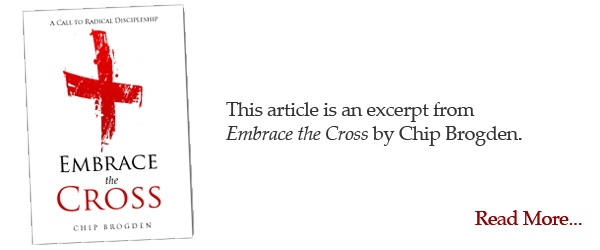Whenever they pick up the Bible they instantly find spiritual nourishment. It seems as though the words on the page leap out at them. Everything about their Christian life is effortless.
In the beginning of their Christian walk these new disciples enjoy being around other believers. Going to church or participating in some kind of ministry is the greatest thrill of their lives. They are burdened for lost souls, and can witness with great boldness to everyone they meet. What they lack in experience they make up for in pure zeal.
But strangely enough, a change begins to take place after they have spent some time walking with the Lord. Prayer becomes more and more of a chore. They can go through the motions of praise and worship, but it seems very dry. When they read from the Bible they find little that interests them. If they enjoyed going to church before, now they have to force themselves to attend, and are inclined not to go at all. They seem to have lost their burden for souls and seldom open their mouth to witness. Indeed, all their former activities seem laughable to them, even hypocritical, when they consider their former state and compare it to their present state. Perhaps the church will encourage them to redouble their efforts in an attempt to restore their good feelings, but nothing seems to work.
Should we consider these Christians to be backslidden? Have they lost their first love? Or has God simply forgotten all about them? In a word, these young disciples were once able to dress themselves and go wherever they wanted to go. But now that they are older, they are being led by Another who intends to take them in a direction they would never choose on their own – because it will mean the death of Self.
The Narrow Path of Self-Denial
Since most Christians believe their spiritual life is at its highest whenever they “feel” spiritual, they deem it to be at its lowest whenever they “feel” unspiritual. In other words, as long as prayer and praise is flowing like a river then they must be doing the right thing. As long as Bible reading, church attendance, and good works are enjoyable then they believe they are on the right track. But if ever they begin to feel uneasy, dark, or dreary in their walk they (incorrectly) believe that they have lost something of their former status as “powerful” believers.
What we must understand is that spiritual life has nothing to do with how we FEEL. But some disciples reason along these lines: “Today I was able to rise with the sun and pray with great feeling. My devotional reading really spoke to my heart. I am at peace and full of joy. This is the spiritual life!” But the day following, they may say to themselves, “Today I overslept and could not really enter into prayer. My devotions were dry and unsatisfying. I know I am saved, but I do not feel particularly spiritual today. I have lost my spiritual life.”
Brothers and sisters, I am acquainted with enough people to know that what I am describing does not affect a small number of Christians, but is in fact the experience of many believers. They believe their spiritual life is at its highest when they feel spiritual, and believe it is at its lowest when they feel unspiritual. This is because they believe the Lord only wants positive, bright, happy, and delicious things for them. The reality is that they have mistaken a life of feeling for a life of faith.
The truth is that when we are young, we may dress ourselves and go about as we wish. But true spiritual growth is less of me, and more of Him (John 3:30). The true evidence of growth is not how we feel about ourselves, or what other people judge us to be. Our spiritual walk is not the sum total of all our wonderful experiences and feelings. True growth is the decreasing of Self and the increasing of Christ. True “spiritual power” is based in weakness, not strength. True “spiritual life” is based in death: “It is no longer I that live, but Christ that lives in me” (cf. Galatians 2:20). So when we are older in the Lord, we may no longer lead ourselves, but we must stretch forth our hands and allow Another to dress us and lead us where WE would not choose to go; yet it is as necessary as it is inevitable.
One characteristic of young disciples is their ability to dress and lead themselves. They find it very easy to go out and to come in. They are zealous and full of good works. If they see a need, they move at once to fill it. If they want to go somewhere, they simply go. If they want to say something, they simply say it. If they want to do something, they simply do it. They are full of plans and pursuits.
We are not suggesting that this is necessarily wrong, but we are suggesting that this is only the beginning stage of spiritual growth. The real question is not what need do I want to fill, or where do I want to go, or what do I want to say, or what do I want to do. The question is: what glorifies the Lord? Whenever “I” do something I consider spiritual and good, it is, nevertheless, “me” who does it. Often we do what glorifies us – the Lord and His Need are seldom considered. But when we ask what glorifies the Lord, we see (in this passage at least) that the Lord is glorified when He is able to dress us and lead us where HE wants us to go – with no interference from Self.
Spiritual maturity is not being able to do more or less, it is being able to do nothing of myself. God is more glorified in my “death” than in my “life”. It is most difficult for people to see this. They have been told that God “hired” them to put them to work for His Kingdom. If they do not report or “work” every week then (they are told) God’s Kingdom suffers loss. Instead of the Lord’s easy yoke and light burden, Religion gives them a difficult yoke and a heavy burden.
Those who are young may have complete liberty to dress themselves and go wherever they please. But after some time the Lord begins to touch those things, and we find it increasingly difficult to live, move, or do anything of our own accord. Self begins to be replaced with Christ, and Someone Else begins to dress us and take us to places where we would not wish to go.
The Lord’s Prisoners Are Really At Liberty, Though Bound
“I, Paul, the prisoner of the Lord, implore you…” (Ephesians 4:1a).
T. Austin-Sparks addressed an assembly of believers in Manila back in the 1960’s. The saints there had repeatedly pressed him to come sooner, but no amount of persuasion could get him to come until he had the Lord’s direction. When he finally did arrive, he explained why he had been so long in coming: “You know, dear friends, we are the prisoners of the Lord Jesus. We cannot go where we would like to go. And we cannot move when we would like to move.”
In this simple illustration we see the difference between the young and the old. The young are independent and free. If the way is blocked, they work at once to break through the blockage. They never consider that perhaps the way is blocked because they are still dressing and leading themselves. But the ones who know the Lord are not independent and free. They are restricted like a prisoner. How so? Because Someone Else decides if they will or will not go, what they will or will not say, and what they will or will not do.
There is a liberty that is really not liberty at all, it is a kind of disguised bondage. Many will proclaim themselves to be “free” when it should be clear that true freedom is not the ability to do as I please, but to be free from doing as I please; for when I do as I please, when I follow my own will and my own way, it just leads to more bondage.
On the other hand, there is a bondage that is really not bondage at all, it is a kind of disguised liberty. The prisoners of the Lord know something of this “disguised liberty”. By stretching forth their arms to be dressed and led about by Another, they seem to be throwing away all their “rights”. How strange, we think, that the Lord often puts His greatest ambassadors in chains – literally and figuratively. But the prisoners of the Lord have more liberty in their “bondage” than most people have in their “liberty”.
What does it mean to be the prisoner of the Lord? It means that we are not our own anymore. We do not belong to the world. We do not belong to the earth. We do not even belong to the Church. We are the Lord’s peculiar possession. As the prisoner of the Lord we give up all our rights. We give up our independent ways and submit ourselves to His Will and His Kingdom in all things.
Now when we first come to the Lord we truly think we are giving him our all, but we cannot fully appreciate just how powerful Self is. It cannot be dealt with in a once-and-for-all manner. It requires many seasons of God’s dealings for us to see the truth about the Lord, and the truth about ourselves. That is why I say there is more hope for someone who is ready to give up and quit than there is for someone who keeps promising to do better tomorrow. Only after we have tried and failed one hundred, one thousand, or one million times will we at last be able to say, “Lord, I finally understand now that I can originate nothing of my own self, because whenever I do, I meet with nothing but defeat. So I am finished! Henceforth, not my will, but Your Will be done!”
These words are not uttered easily. Anyone can mouth these words and give their mental assent to them, but their behavior all too often contradicts their confession. So the Lord must labor long and hard to work this INTO us as a heart-attitude and not just lip service. Many Christians wonder why their circumstances are so difficult. They wonder why things never seem to go their way. They wonder why everything seems to rise up and challenge them. At the risk of oversimplification, let me say that the primary reason for this is the Lord intends to reduce you to Himself and make you His prisoner.
As the prisoners of the Lord we have no control over our environment, our going out, or our coming in. The truth is that control is an illusion. The Wind blows where He wishes (not where we wish), and you cannot tell where He is coming from or where He is going (cf. John 3:8). So often we think we have God, the Bible, the Church, and our Christian life all figured out. We have an answer for every situation. We have a solution for every problem. Suddenly the Wind shifts, and we realize we know nothing at all. We learn that we do not move the Wind, but the Wind moves us. This is God’s way of decreasing us and increasing Christ. We learn from experience that “apart from Me, you can do nothing” (John 15:5b).
Increased Difficulties Indicative of Spiritual Maturity
“Whoever wants to come after Me must deny himself, take up his cross every day, and follow Me” (Luke 9:42).
The Cross explains why things seem to get increasingly difficult for us the farther down the Narrow Path we go. Assuming we are not living in sin and our heart is right before God, when we no longer “feel” as we once did, does it mean something is wrong? Many Christians would answer yes, something must be wrong. Should we then ask the Lord to restore our good feelings? Again, many Christians, misled into thinking that the Christian life should be one continuous string of mountain-top experiences, would say yes. On the contrary, we should realize that the Lord intends for us to walk by faith, and this is contrary to walking by how we feel.
In order to teach us the Lord frequently permits us to have a number of spiritual experiences in the beginning of our training. Or, we may hear His voice plainly telling us what to do and where to go. This, of course, is necessary for children who cannot know otherwise. But over time these experiences become less and less frequent. Why? Because He wishes for us to walk with Him without the benefit of a spiritual experience or a good feeling or a clear voice. Now, in order to walk with Him, we must learn to do so based on relationship.
Here is the problem with walking by feelings. If I feel spiritual today, then I will pray, sing, read the Scriptures, and witness with great fervor. But if I feel unspiritual today, then I will do nothing. If this is how we live then we should see that it does not matter whether our feelings are good or bad, or if they result in good works or no works. Either way, we are still living based on how we feel and not based on our union with Christ. Even my “good works”, solely motivated by how I feel, are rooted in Self. They are just as self-centered as my evil works. My feelings, whether they are good, bad, or indifferent, are in the domain of Self, and Self with all its feelings must be delivered over to death. It does not mean a Christian should be totally devoid of feeling, but it means a disciple of the Lord is not ruled by feeling.
This is the practical application of the Cross. Only prisoners carry the Cross – “free” men do not. Those who love themselves will never take it up. For it means they have the sentence of Death in them. Obviously this does not “feel” good, so those who live by how they feel will find it unbearable. It is intended to bring my life to an end so that I may pass through death and come onto Resurrection ground. This is the purpose of all God’s dealings with us as disciples. The sooner we become the Lord’s prisoner, the sooner we will see His purpose realized in us.
What does it mean to be the prisoner of the Lord? First and foremost, it means giving up our freedom. It means we are no longer free to dress ourselves and go where we please. Others may be able to do as they like, but prisoners of the Lord are not free to do as they like. Others may be able to press ahead no matter what, but all our times and movements are in His hands.
Second, being the prisoner of the Lord means we must accept lengthy periods of solitude. We welcome opportunities for fellowship and friendship when those opportunities present themselves, but as the Lord’s prisoner we are frequently asked to be alone and shut up with God. All our relationships must have the imprint of the Cross upon them. That is, we give our friends and our family over to God and receive them back from Him again. In this way the Lord maintains His preeminence.
Third, to be the prisoner of the Lord means that we accept the sentence of death and are resigned to our fate. We are not the Lord’s prisoner if we are still protesting our innocence. If we do not agree with the Lord that Self is worthy of death then we unnecessarily delay the inevitable. If we must take up the Cross and be crucified, it is better to submit ourselves to it as Christ did, giving up our spirit into the Father’s hands, and bowing our head in peace. So let us drink the Cup that the Father gives us. If we struggle and protest, like the two thieves, then we only prolong our agony, and the soldiers must come and break our legs. Either way, the Cross means death. The sooner we surrender to it the sooner we find Resurrection.
It is a glorious thing to be the prisoner of the Lord, for in our bonds we find liberty. In our weakness we find strength. In our foolishness we find wisdom. In our poverty we find prosperity. By losing everything we find everything. By giving up all things we inherit all things. By accepting the sentence of death we find the Life of the Lord. Let us stretch forth our hands and allow Him to dress us and lead us where He wishes us to go, in the way we would not choose for ourselves, for that is the Narrow Way, and it is the path of blessing, though it be disguised. May the Lord confirm this word to our hearts. Amen.













